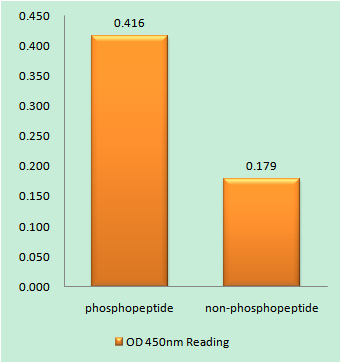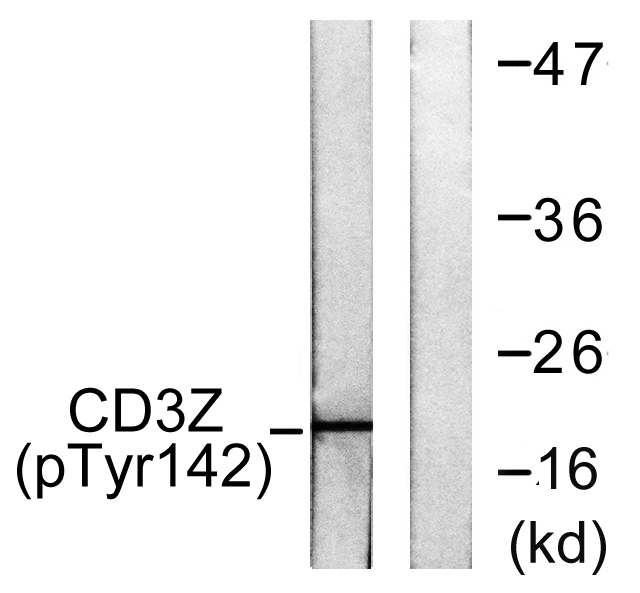CD3 ζ (phospho Tyr142) Polyclonal Antibody
- Catalog No.:YP0051
- Applications:WB;IHC;IF;ELISA
- Reactivity:Human;Mouse;Rat;Monkey
- Target:
- CD3 ζ
- Fields:
- >>Natural killer cell mediated cytotoxicity;>>Th1 and Th2 cell differentiation;>>Th17 cell differentiation;>>T cell receptor signaling pathway;>>Chagas disease;>>Epstein-Barr virus infection;>>Human immunodeficiency virus 1 infection;>>PD-L1 expression and PD-1 checkpoint pathway in cancer
- Gene Name:
- CD247
- Protein Name:
- T-cell surface glycoprotein CD3 zeta chain
- Human Gene Id:
- 919
- Human Swiss Prot No:
- P20963
- Mouse Gene Id:
- 12503
- Mouse Swiss Prot No:
- P24161
- Immunogen:
- The antiserum was produced against synthesized peptide derived from human CD3 zeta around the phosphorylation site of Tyr142. AA range:111-160
- Specificity:
- Phospho-CD3 ζ (Y142) Polyclonal Antibody detects endogenous levels of CD3 ζ protein only when phosphorylated at Y142.
- Formulation:
- Liquid in PBS containing 50% glycerol, 0.5% BSA and 0.02% sodium azide.
- Source:
- Polyclonal, Rabbit,IgG
- Dilution:
- WB 1:500 - 1:2000. IHC 1:100 - 1:300. ELISA: 1:5000.. IF 1:50-200
- Purification:
- The antibody was affinity-purified from rabbit antiserum by affinity-chromatography using epitope-specific immunogen.
- Concentration:
- 1 mg/ml
- Storage Stability:
- -15°C to -25°C/1 year(Do not lower than -25°C)
- Other Name:
- CD247;CD3Z;T3Z;TCRZ;T-cell surface glycoprotein CD3 zeta chain;T-cell receptor T3 zeta chain;CD antigen CD247
- Observed Band(KD):
- 20kD
- Background:
- The protein encoded by this gene is T-cell receptor zeta, which together with T-cell receptor alpha/beta and gamma/delta heterodimers, and with CD3-gamma, -delta and -epsilon, forms the T-cell receptor-CD3 complex. The zeta chain plays an important role in coupling antigen recognition to several intracellular signal-transduction pathways. Low expression of the antigen results in impaired immune response. Two alternatively spliced transcript variants encoding distinct isoforms have been found for this gene. [provided by RefSeq, Jul 2008],
- Function:
- disease:Defects in CD247 are a cause of primary T-cell immunodeficiency [MIM:610163]. Affected individuals suffer of recurrent infections. Patients T-cell counts are very low and B-cell counts are normal.,domain:The ITAM domains mediate interaction with SHB.,function:Probable role in assembly and expression of the TCR complex as well as signal transduction upon antigen triggering.,online information:CD247 mutation db,PTM:Phosphorylated on Tyr residues after T-cell receptor triggering.,similarity:Belongs to the CD3Z/FCER1G family.,similarity:Contains 3 ITAM domains.,subunit:The TCR/CD3 complex of T-lymphocytes consists of either a TCR alpha/beta or TCR gamma/delta heterodimer coexpressed at the cell surface with the invariant subunits of CD3 labeled gamma, delta, epsilon, zeta, and eta. CD3-zeta forms either homodimers or heterodimers with CD3-eta. Interacts with SLA and SLA2. Interacts w
- Subcellular Location:
- Cell membrane ; Single-pass type I membrane protein.
- Expression:
- CD3Z is expressed in normal lymphoid tissue and in peripheral blood mononuclear cells (PBMCs) (PubMed:11722641).
Single-intraosseous simvastatin injection suppresses cancers via activating CD8+ T cells BIOMEDICINE & PHARMACOTHERAPY Chunli Song WB Mouse
- June 19-2018
- WESTERN IMMUNOBLOTTING PROTOCOL
- June 19-2018
- IMMUNOHISTOCHEMISTRY-PARAFFIN PROTOCOL
- June 19-2018
- IMMUNOFLUORESCENCE PROTOCOL
- September 08-2020
- FLOW-CYTOMEYRT-PROTOCOL
- May 20-2022
- Cell-Based ELISA│解您多样本WB检测之困扰
- July 13-2018
- CELL-BASED-ELISA-PROTOCOL-FOR-ACETYL-PROTEIN
- July 13-2018
- CELL-BASED-ELISA-PROTOCOL-FOR-PHOSPHO-PROTEIN
- July 13-2018
- Antibody-FAQs
- Products Images

- Enzyme-Linked Immunosorbent Assay (Phospho-ELISA) for Immunogen Phosphopeptide (Phospho-left) and Non-Phosphopeptide (Phospho-right), using CD3 zeta (Phospho-Tyr142) Antibody

- Western blot analysis of lysates from Jurkat cells treated with UV 15', using CD3 zeta (Phospho-Tyr142) Antibody. The lane on the right is blocked with the phospho peptide.



